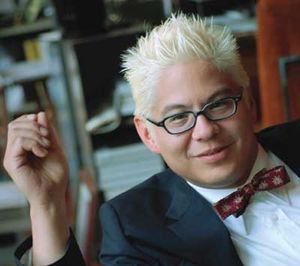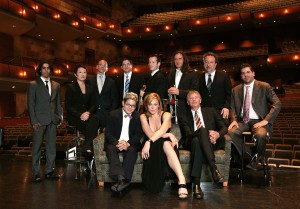In one way, it’s hard to believe that Pink Martini are nearly twenty years old. In another, it seems like they have always been here—a living compendium of all easy listening music that has ever gone before. Music historians or gaudy anachronisms—opinions differ on their place in the realm of popular music. But one thing is certain: there is no other musical aggregation in the world that can approach the incredible feats of sonic perfection Pink Martini regularly demonstrate. Whether you like them or not, there is no denying that their music is always pitch perfect, spot on and impeccably pristine. In that regard, this new record is their crowning achievement.
 Prolific is one thing this band is not. This being only their fifth album since 1994 (they have also released a Christmas disc, A Retrospective—a compilation of Martini favorites, and 1969, a collaboration with Japanese singer/actress Saori Yuki), it could be said that they approach the recording process with a certain leisurely indifference. That, combined with bandleader Thomas Lauderdale’s legendary perfectionism and notorious attention to minute detail, and it’s a wonder anything at all has ever emerged from the recording studio.
Prolific is one thing this band is not. This being only their fifth album since 1994 (they have also released a Christmas disc, A Retrospective—a compilation of Martini favorites, and 1969, a collaboration with Japanese singer/actress Saori Yuki), it could be said that they approach the recording process with a certain leisurely indifference. That, combined with bandleader Thomas Lauderdale’s legendary perfectionism and notorious attention to minute detail, and it’s a wonder anything at all has ever emerged from the recording studio.
But with that said, it would appear that the group have managed to average three-year intervals between their last three releases—Splendor in the Grass (2009) and its predecessors, Hey Eugene (2007) and Hang On Little Tomato (2004). So perhaps that’s the band’s flight path. Three years circling the runway. We should be happy with that. It beats Kate Bush or Peter Gabriel by ages.
And Thomas Lauderdale is no ordinary perfectionist. He is attempting to replicate eras (if they ever actually existed) that generated music and sound no longer available to today’s typical listener. At least not without an extensive primer—which is precisely what Lauderdale intends to offer. His music is not easily defined. But the four cardinal points would have to be in the directions of the exotica of Martin Denny, the space age bachelor pad sensibilities of Juan Esquivel, the flash and dash of Liberace and the champagne comportment of Lawrence Welk.
There are numerous tertiary points, including obscurely campy and kitschy popular and traditional musical references gathered from all over the world: China, Japan, Romania, Turkey, Iran, France, Cuba, Brazil—as well as a broad selection of material culled from the American standard songbook. Thomas Lauderdale and Pink Martini are out to change the world the old fashioned way. They are going to entertain you. Forget your troubles, c’mon get happy! That’s about as far from our times as a musical entity can get!

This new release marks the first recorded return of vocalist China Forbes since her vocal cord surgery in 2011. It’s also the debut for vocalist Storm Large, who substituted at live engagements for Forbes during her extended convalescence. And, as has become Pink Martini custom, several guest vocalists make appearances, most endearingly, Phyllis Diller, who only months before her death last year, recorded with Thomas a delightful version of Charlie Chaplin’s song, “Smile.”
Lauderdale and his orchestra create a world of their own, a world of crystal aural clarity and fine-cut dynamic refringence. It sounds better than the music to which it pays homage, with equipment and techniques undreamt of in prior technologies. And the wizard behind that sonic curtain is one generally unheralded Dave Friedlander, engineer deluxe (and here credited for the first time as a co-producer).

Dave works at Kung Fu Bakery studios—he now even has his own room there (where, he emphasizes, he’s offering “affordable rates”). I’ve known him for over fifteen years, but he recently came to mind earlier this summer when I was rummaging through the 6,000 CDs in my garage trying to get them organized. In doing so I ran across my long lost Trip Shakespeare album, Across the Universe, one of my favorite albums of all time. I’d been looking for that thing for six or seven years. Finally had it back.
I set about to playing it and checking out the CD booklet, as it had been so long, it was like it was brand new all over again. As I perused the back cover I noticed something among the names in the “Recorded By” category. One was David Friedlander. First among the names of “Engineers” was that same David Friedlander. Then I remembered that before he came to Portland in the mid-90s Dave hailed from Minneapolis—where he worked on a few Prince albums in the same capacity. Across the Universe was released in 1990 by a Minneapolis band (a few members later became Semisonic, who had a hit with “Closing Time” in 1998). Hmm. It was great to see his name on one of my favorite albums, but not surprising.

And, though he has served Pink Martini well through all of their previous stellar recordings, Dave Friedlander outdoes himself here—so much so that beyond co-producer, it is almost as if he is another member of the band. He plays parts in the quiet of space, that add subtle touches which most listeners might not realize they’re hearing, though knowing that what they do hear sounds absolutely incredible.
So for this album, it’s all come together for Pink Martini. The ten-piece instrumental ensemble—together with the regular inclusion of the vibrant strings of the Harvey Rosenkrantz Orchestra—is in fine form, navigating musical styles drawn from all over the world. It includes, for the first time on any recording, both female vocalists. The material is first rate, the prestigious guest stars, tastefully employed. If you’re a Pink Martini fan—and let me tell you there are a lot of them across the nation!—prepare to be knocked out. If you’re not a fan, this album is worth auditioning, if only once, just to hear what a perfect recording sounds like. This one is absolutely flawless.
We begin our journey in Germany, with “Ich dich liebe,” and China in the role of starlet Mamie Van Doren in the 1964 German B-movie released in the US as The Sheriff Was a Lady. This is a truly faithful version of the spritely original, with bright, cheerful horns and lullaby strings. It’s a great song, especially wonderful considering how bad the movie is—but the kitsch factor is incredibly high here. China plays it straight, giving her all, demonstrating straight-off that her voice has returned to its former grandeur.
Storm steps to the mic, as we jet to Brazil for a brilliant reconstruction of “Quizás, quizás, quizás,” first performed by Maysa Matarazzo (who, because of her troubled life, later became known as “the Janis Joplin of Bossa Nova”) in 1964. Storm’s sultry delivery matches Matarazzo’s, registering similar heat on the vocal Scoville scale—an arrangement lovingly duplicated from the original version.

Australian cabaret star Meow Meow takes the lead on “I’m Waiting For You,” a number derived from ‘40s Chinese vocal legend Bai Guang. Bai’s version has been sampled and re-mixed by DJs several times in the recent past. Pink stick faithfully to the spirit of the original, but they add unique touches of their own, sounding like music taken from a Bogart film. Gavin Bondy’s silky muted trumpet solo contributes a smoky essence to the mood.
Authentic Persian instrumentation provides the backing for Storm on “Omide zendgani.” Utilizing santoor (like a hammered dulcimer), kamache (violin) and setar (guitar) the ambience is struck in an extended introduction. Thomas’ dramatic piano and chirping brass are prominent as Storm delivers a warm, straightforward reading of the lyric. This rendition is modeled after a Dinah Shore performance on NBC in 1965, although her original lacks the vibrant intro and Storm’s far more passionate vocal. Who knows where in the hell Thomas saw the Shore clip in the first place to be inspired to learn the tune!

Lush piano and stirring strings set the scene for NPR personality Ari Shapiro’s operatic guest reading of “Yo Te Quiero Siempre,” composed by famed Cuban pianist Ernesto Lecuona. It’s a somber song expressed with grave solemnity. What we here in the states refer to as a real bringdown. But tastefully done. A modern day Canio from Pagliacci. Laugh, clown, at your broken love.
“Je ne t’aime plus” features China paired with the eccentric French pop star Philippe Katerine, who has long been recognized in his homeland for his absurd (sometimes political in context) videos. The two of them composed this song, a sort of Franco bossa nova with dappled harp, evoking Joao and Astrud Gilberto’s “Corcovado.” A French bossa nova is entirely in keeping with a tradition dating back to the ‘50s and Henri Salvador. Here, the banter between the two vocalists consists of some poor schmuck berated by, and defending himself from, an (ex?) girlfriend. In other words, typical French fare—ça va.

The jaunty presentation of “Zundoko-bushi” belies a rather downcast lyric. Pink percussionist Timothy Nishimoto leads a large supporting guest chorus through a rousing interpretation of a Dorifu (the Japanese Drifters comic troupe, who performed a forty-second long opening set for the Beatles in Tokyo in 1966) classic from the late ‘60s. The song rocks—or at least in a Pink Martini landscape it rocks—propelled by Anthony Jones’ high-impact kit work. Bassist Phil Baker’s prickly sitar solo lends oddball character to the proceedings as well.

The Romanian torch song “Până când nu te iubeam” was made to order for Storm Large’s vocal talents. What’s more, this track is Dave Friedlander’s true moment in the aural sun. Opening with pert piano chords and trotting pizzacato strings, an Arabian cum gypsy theme is voiced by the orchestra, soon joined by a skittering balalaika-like mandolin figure not to be heard on the original by Maria Tanase. Subtle, other worldly effects usher in the triangle and tambourine augmentation in the second verse.

There is a timeless majesty to this track. A golden twilit glow swirls around Storm’s seductive voice. Though Maria Tanase (known as the “Romanian Piaf”) sets a very high vocal standard for this song, Storm matches it with slow, simmering intensity. The arrangement here far exceeds the simple treatment, Tanase’s version received for her recording in the ‘50s.
Like so many of the pieces featured here, Pink Martini use the original arrangements from these very obscure songs only as basic templates for their own very respectful interpretations. And it is Pink’s inherent ability to embellish and enhance the arcane source material that makes the orchestra so special. No one else in the world does what they do with such faithfully staunch dedication. A labor of pure love.
Check out their loyal reproduction of Chet Baker’s take on the Rodgers & Hart chestnut “She Was Too Good to Me.” Trombonist (and co-producer) Robert Taylor delivers an uncanny imitation of Baker’s wan singing voice, while Gavin Bondy’s flugelhorn solo casts a darker shadow than the ’74 edition. The only real difference between Pink’s and Chet’s is that Thomas plays an acoustic piano where Bob James played electric piano—and this recording sounds even better than Creed Taylor’s original production on the CTI label.

With the Turkish delight of “Üsküdar’a Gider İken,” China takes her shot at a Maysa Matarazzo reproduction. Rich flavors of koto, harp and flute float through the mix. It’s a cinematic performance suggestive of some Bond soundtrack from the ‘60s.
The familiar mambo “Sway” probably has more in common with Rosemary Clooney and Perez Prado’s 1959 rendering than Dean Martin’s from 1954. With Storm taking the lead, Thomas’ prancing piano commingles with Maureen Love’s harp in glistening arpeggios, as chunky Latin percussion and low-humming reeds pool beneath. The Pacific Youth Choir breezes a soft moonlight chorus—captured in all its radiance by the ever-adept Dave Friedlander. His mixes are always spacious and panoramic without a lot of obvious gimmickry.

Members of the Von Trapp family (of The Sound of Music fame) provide angelic vocal support for guest Rufus Wainwright’s touching performance of his aunt Anna McGarrigle’s very strange ballad “Kitty Come Home.” Over subdued full-orchestral backing the vivid piece unfolds over Wainwright’s quavery vocal—with some (probably intentional) lyrical ambiguity as to whether the Kitty in question is human or feline.
China’s take on the Irving Berlin chestnut “What’ll I Do?” is straightforward, the instrumentation replicated by arranger Stephen Taylor to conform to Nelson Riddle’s score for the 1974 film adaptation of The Great Gatsby. Wainwright and China join to re-create the famous duet between Barbra Streisand and Judy Garland for her 1963 television show, braiding together the depression-era nuggets “Get Happy” and “Happy Days Are Here Again.” And while Rufus and China aren’t quite up to the level of those two celebrated divas, they give the songs their best efforts.

A brief instrumental interlude follows, primarily Thomas at the piano, with a simple setting of Scott Joplin’s composition “Heliotrope”—which serves as introduction to Phyllis Diller’s final recording, “Smile.” With simple backing from Thomas at the piano, Phyllis, sounding old and frail, still manages to bring to sparkling life the bittersweet lyric. In my case, hearing her voice made the hair on my arms stand up rigid. No song could possibly better suit her, nor be a better salute to her life and career. Very touching.
A Pink Martini album is like a film. There are scenes and acts. It is not simply the work of (an indeterminate number of) artists directly affiliated with the organization, but with the additional input of countless other musicians. A cast of hundreds! Few popular music bands in the world can pull off what they do. A simple rock band is incapable of such musical flights of fancy.

Pink Martini elevate nostalgia to the level of historical reference. They do not take their source material lightly. In all cases they appear intent on improving upon the originals. Sonically, they succeed in nearly every case. It’s a perfect recording.
As a critic once opined of Lawrence Welk, “This is the squarest music this side of Euclid.” Get Happy is Euclid ska-ware, no doubt. Euclid square SQUARED, perhaps! And while some of these cuts border on outright (better sounding) forgery, they stand as the sincerest form of flattery for music nearly lost, but not forgotten—not as long as Pink Marini remain in existence.


